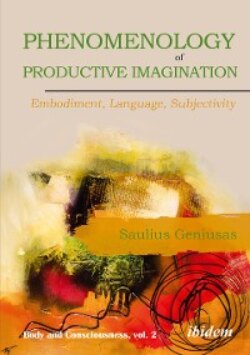Читать книгу Phenomenology of Productive Imagination: Embodiment, Language, Subjectivity - Saulius Geniusas - Страница 4
На сайте Литреса книга снята с продажи.
ACKNOWLEDGMENTS
ОглавлениеSome of the chapters in this study are reworked versions of previously published essays. Chapter I includes excerpts from the Editor’s Introduction to Stretching the Limits of Productive Imagination: Studies in Kantianism, Phenomenology and Hermeneutics (ed. by S. Geniusas, London: Rowman & Littlefield, 2018). A shorter version of Chapter II was published under the title “What is Productive Imagination? The Hidden Resources of Husserl’s Phenomenology of Phantasy,” in The Subject(s) of Phenomenology (ed. by I. Apostolescu, Dordrecht: Springer, 2020, 135-153). Chapter III includes extracts from “The Stuff That Dreams Are Made Of: Max Scheler and Paul Ricœur on Productive Imagination,” which was published as a chapter in Hermeneutics and Phenomenology: Figures and Themes (ed. by S. Geniusas and P. Fairfield, New York: Bloomsbury, 2018, 93-105). An earlier and shorter version of Chapter IV was published under the title “Productive Imagination and the Cassirer-Heidegger Disputation” in Productive Imagination: Its History, Meaning and Significance (ed. by S. Geniusas and D. Nikulin, London: Rowman & Littlefield, 2018, 135-155). A shorter version of Chapter V was published under the title “Miki Kiyoshi and the Logic of the Imagination” in Stretching the Limits of Productive Imagination (ed. by S. Geniusas, London: Rowman & Littlefield, 2018, 91-111). An abridged version of Chapter VII was published under the title “Between Phenomenology and Hermeneutics: Paul Ricœur’s Philosophy of Imagination” in Human Studies 38/2, 2015, 223-241. Chapter VIII was published previously under the title “Against the Sartrean Background: Ricœur’s Lectures on Imagination” in Research in Phenomenology, 46/1, 2016, 98-116.
In May 2016, I organized an international conference, Productive Imagination: Its History, Meaning and Significance, at the Chinese University of Hong Kong. The conference participants came from twelve different countries in Asia, Europe and North America. I have continued discussions with many of them to this day. I had all of their papers, which were subsequently published in various volumes, in mind while writing this book. A special word of thanks is due to Suzi Adams, Claudia Baracchi, Jagna Burdzinska, Nicolas de Warren, Annabelle Dufourcq, Alfredo Ferrarin, Gediminas Karoblis, Dalius Jonkus, Claudio Majolino, Eric S. Nelson, Kwok-ing Lau Dmitri Nikulin, Witold Plotka, Roger W.H. Savage, Michela Summa, George H. Taylor, Qingjie James Wang and Günther Zöller. I would like to extend my gratitude to George H. Taylor and Patrick Crosby for sharing with me Paul Ricœur’s so-far unpublished lectures on productive imagination that were delivered at the University of Chicago in 1975. For some time now, George H. Taylor and Patrick Crosby had been preparing these lectures for publication together, and now, after Patrick Crosby passed away in 2020, it is to be expected that George H. Taylor will be the sole editor of the volume. I would also like to thank John Krummel for sharing his so-far unpublished translation of the second chapter of Miki Kiyoshi’s “Institution”—the second chapter of Miki’s The Logic of the Imagination. A special word of thanks is also due to James R. Mensch, the editor of the book series, Body and Consciousness, in which this study is being published, and to the two reviewers for their constructive feedback.
Furthermore, I would like to express my sincere gratitude to the Alexander von Humboldt Foundation for the Research Fellowship that made the preparation of this book possible. A significant part of this book was written in the Husserl Archive at the University of Cologne. A special word of thanks is also due to Dieter Lohmar, the Director of the Archive, for all of his hospitality and support.
